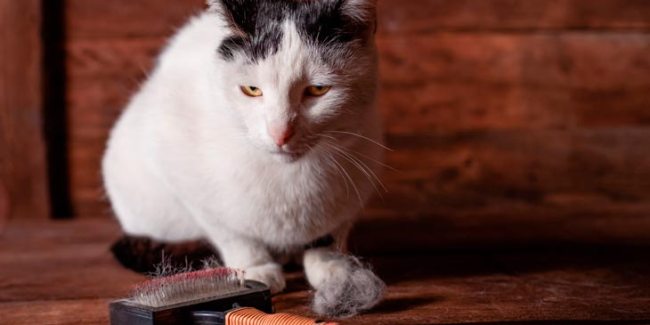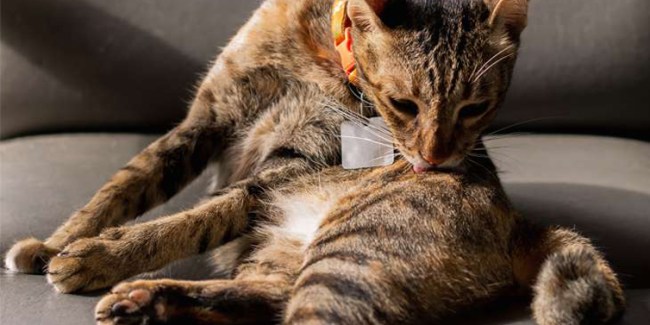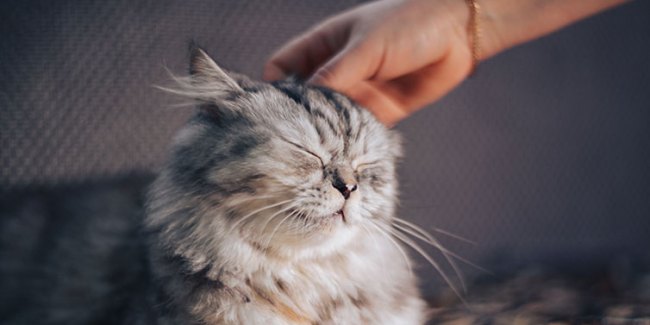Cats: The Golden Years
You know what it’s like… you brought home that tiny little ball of fluff and before you know it, several years have flown by; you do your multiplication and realise that you may have a ‘senior’ kitty on your hands. You check for impending signs of old age, but you can’t find any. You look carefully into kitty’s face but of course, unlike humans, there’s no sign that he/she needs a facelift. But eventually, there’ll be some signs of slowing down. This is not necessarily a sad downward slope to ‘the end’ though; the Golden Years for your cat are just another phase and kitty will cope with it, with your help. There is no reason, apart from serious illness, that your elderly ‘ball of fluff’ cannot enjoy these senior years – and so can you. But there are a few adjustments that you’ll need to make…
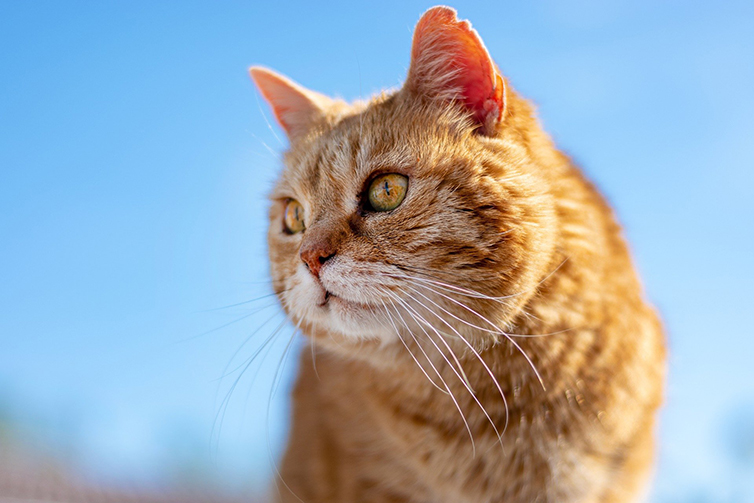
Can we give a name and sex to ‘he/she’? His name is Buster and he’s a very beautiful and smart ‘moggie’, with a biological mom or dad who probably carried quite a lot of Persian genes. His human dad is Steve and he is very concerned about how he’s going to deal with Buster’s elderly years. So, after extensive research, we felt that we should answer some of Steve’s questions, which should also help all of you cat owners out there. (Whoops! Of course no-one can actually ‘own’ a cat. You are privileged that your kitty has chosen to share HIS home with you, and you will be his/her servant for evermore. Accept it, and both of your lives will be happier.)
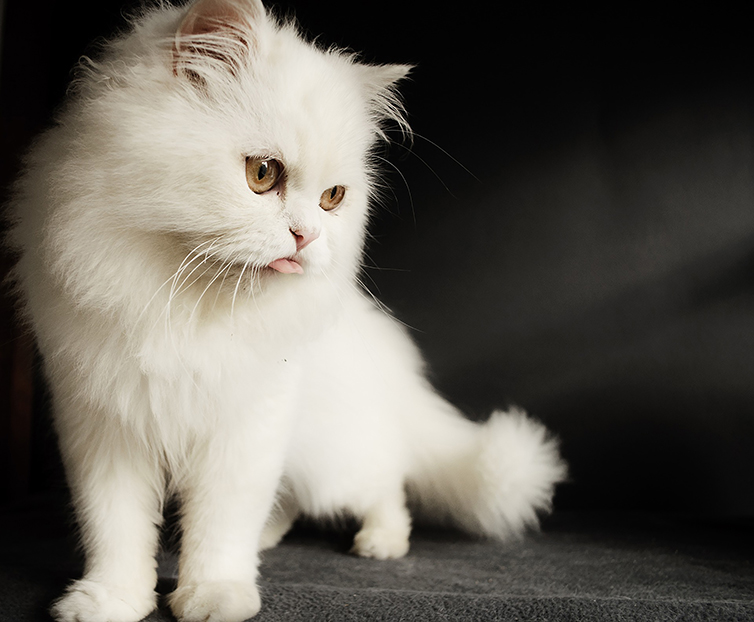
Buster is around 8/9 ‘human’ years, so he’s around 60 in cat years, right?
Weeell … not really. Things have changed and, thanks to improved veterinary care and nutrition, many cats are now living to 17/18 years of age. Some even make it into their 20s! So, most vets do not go along with the old method of simply multiplying a cat’s age by 7, which also does not take into account that cats grow up much faster in the first couple of years. In fact, by the new scale, a 2-year-old cat will be 24 years old! But don’t worry, this rate slows down significantly, so that a cat of Buster’s age is not in his 60s, but is in his 50s. By the time he’s 11, he’ll be considered ‘elderly’; by 12-14 he’ll be ‘senior’ and eligible for his pension, and by 15 upwards he’ll be called ‘super-senior’. (If anyone ‘out there’ wants to work out their moggie’s age, there’s a table at www.cats.org.uk/mature-moggies.)
What changes can I expect as Buster ages?
You’re quite right to ask about this because it’s important that you watch out for changes so that you can deal with them better. Remember, not all ageing moggies experience all or any of these illnesses. You might begin to notice some of the following changes:
Physical Changes
- Buster may start to eat and drink less. His senses of taste and smell might deteriorate as he ages, so food may not be as appetising as it once was. Also, his ability to digest foods like protein and fats may reduce.
- He may experience changes in his vision and hearing.
- His immune system may not be as effective as it once was, leaving him more susceptible to diseases.
- Buster may begin to slow down and lose some muscle tone.
- He might need to defecate and/or urinate more, or less, because of changes to his gastric and urinary systems.
- He might lose interest in grooming himself so that his coat may not be quite as lustrous as it was.
- He may sleep more (Is that even possible?!) or less.
- There are several illnesses associated with feline ageing, such as arthritis and diabetes.
- Buster might become more dependent on you.
Cognitive Changes
Changes in various areas of the brain, as your cat gets older, may result in behaviour changes. This decline, which is similar to human dementia, is called Feline Cognitive Disorder (FCD). It affects around 55 % of cats in the 11-14 age group more than 80 % of cats over the age of 16. Symptoms of this disease may be confusion, disorientation, forgetfulness (He may forget where his litter tray is.), anxiety, loss of sight and hearing and changes in sleep patterns.
But, your cat may display one or several of these symptoms and it is not necessarily a result of FCD. Your vet can run some tests to determine the underlying cause and treat it accordingly. There is no cure for FCD, but there are some treatments to ease symptoms, especially behaviour therapy.
Wow!
That’s quite a scary list, right? But don’t worry. First of all he may not experience all or any of these symptoms and, most important, he has you to help him cope. He, of course, will help you to cope too. Remember that cats, like all animals, do not feel sorry for themselves, unlike humans.
So, what can I do to help him as he ages?
Glad you asked! There are certainly several things that you can do to help Buster have the best quality of life possible.
1. Preventative care
Keep an eye out for any changes in Buster’s behaviour and health. For example, he may lose interest in food; he might seem a bit confused. If you notice anything like this, consult your vet who will check it out.
In fact, all older cats of around Buster’s age and upwards, should have a check-up at the vet around twice a year so that she can run tests and prescribe treatment before any underlying illness gets worse. She may run blood tests, X-rays and weight checks and ensure that his vaccinations are up-to-date.
It is also important to ensure that your cat, whether indoor or outdoor, is protected from ticks, fleas and internal parasites, which can cause illnesses which your ageing cat may struggle to deal with. Try Bravecto® Plus for cats, which provides protection from ticks, fleas for 3 months and is a worm treatment.
2. Health Issues
Just because your cat appears to be well, doesn’t necessarily mean that he is. Now, we don’t want to make you neurotic here, but there are some things that may indicate that he’s not so well such as a loss of energy, a loss of appetite, changes in toilet habits, increased drinking or sleeping. These symptoms need to be checked out by your vet.
Arthritis, kidney diseases, loss of vision and/or hearing and hyperthyroidism are all examples of possible age-related problems. As with humans, if you spot these early, there is an increased chance that your vet will be able to provide treatment early and reduce your cat’s possible suffering.
2. Grooming
Buster has always, like the vast majority of cats, been fastidious about his appearance. (He never knows when he might come across an attractive girl.) But eventually you may notice that he’s become a bit scruffy. This might be because his muscles and tendons are not as flexible as they once were, or he may have a condition like arthritis, making the contortions of his youth painful and difficult. If you begin to notice this, you can help him by brushing his coat with a soft brush, brushing out any small matts before they get bigger, but do this gently. You can check for any new or unusual lumps or sores that may need to be checked by your vet, and this can also be a valuable bonding experience for you and Buster.
If he’ll allow it, use a dampened bit of cotton-wool to clean around his eyes and nose. He may also become less efficient at cleaning his bum, so … sorry about this … you may need to help him occasionally by cleaning it for him and even by trimming his fur around this area to prevent soiling.
You should check his nails regularly and ask your vet how to trim them. Elderly cats’ claws can easily overgrow and get caught in furniture. There is a special tool available for cutting claws which your vet will show you how to use.
3. Toilet Habits
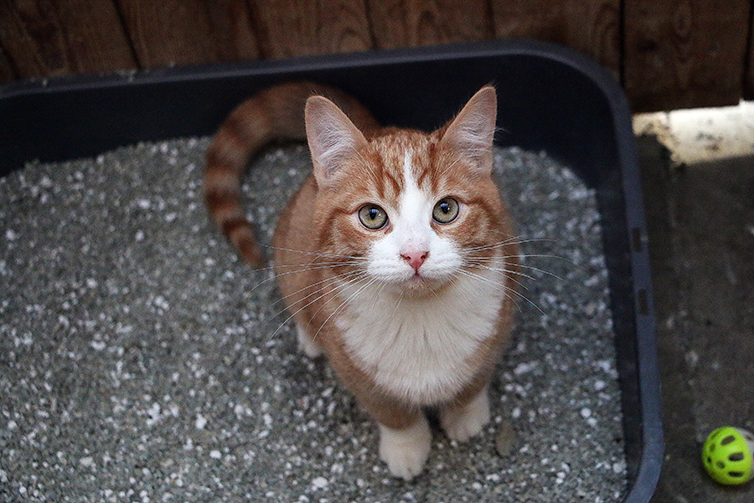
As he ages, Buster may lose interest in going outside, so it’s a good idea to provide him with a couple of large litter trays. As we all know, cats seem to be terribly embarrassed by the whole idea of going to the toilet and particularly if this involves poo. When they’ve finished relieving themselves, they often look around to check that no-body saw them. Older cats feel the same, so provide him with the litter trays and both of you can pretend that they’re for plants. You, of course, have the privilege of removing solid waste and cleaning the trays, but this gives you the opportunity (Aren’t you lucky?) to check his poo and urine for things like blood, which should be investigated.
If he begins soiling in the house – which MAY be a symptom of several disorders, including FCD – once your vet has ruled out physical illnesses, you can help him by providing him with more litter trays/boxes where they’re easy to find and with low sides which are easy to climb into.
4. Teeth
If Buster will allow it, check his mouth regularly for any signs of tooth decay, gum disease or any lumps or sores. Mouth infections, apart from causing him pain and possible loss of appetite, may travel through his blood-stream and make him sick. Your vet will of course check his mouth out and treat any problems.
5. Diet
i.) Loss of appetite
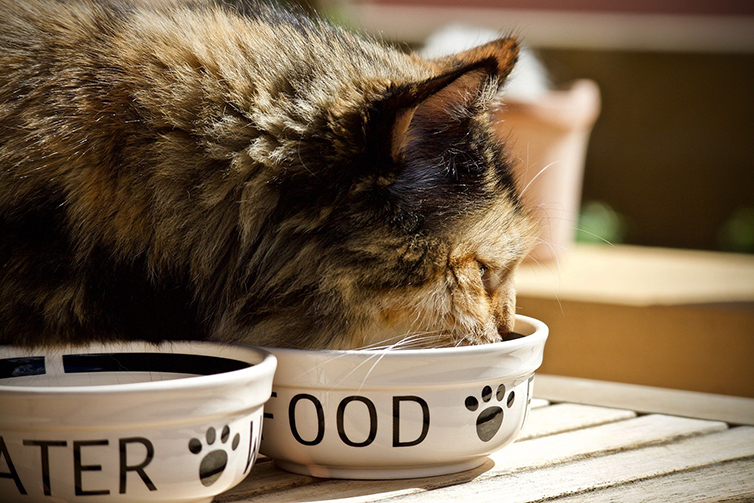
Buster may lose his, once very healthy, appetite as he ages. Bear in mind that loss of appetite may be a sign of an underlying illness, so check with your vet first. Then there are things you can do to encourage him:
- Feed him little and often, and ensure that he feels safe and secure (dogs banned ) in his feeding area.
- Try warming his food a little.
- Try mixing a little new food (on the advice of your vet) into his familiar food. We all like variety in our meals.
- You could add a little water to his food to make it easier to eat.
- If he struggles to eat dry kibble, try putting it in a blender for a few seconds to break it up.
- You could put his food on a small box to avoid his bending his neck which may have become arthritic.
- Try not to leave his food out, especially if it’s wet food, for more than an hour.
- Your presence and stroking him may encourage him to eat. Or he might hate it. You know cats!
ii.) Food
Some cats may develop an inability to digest proteins and fats, so many vets prescribe a low-protein diet. Always consult your vet before making any changes to your cat’s diet. She may advise you to try one of the specialist-type kibbles on the market, made for elderly kitties. She knows his/her medical history and will assist you through choosing from the many choices available.
One of the main problems with many ageing moggies is the possibility of obesity. Cats, by nature, are hunters of small animals. They are built to stalk their prey, burning up many calories in the process. A more sedentary life-style, becoming increasingly so with age, means that many of those calories are not burnt up. In addition, the ‘cat servant’ is always willing to provide plenty of food, which may be calorie-rich. So, what can you do about this, as Buster roams less and sleeps more in his comfy bed?
- Check with your vet. (We can’t say this often enough.)
- Watch your cat’s calorie intake. Check the labels on his food – if you have a magnifying glass handy. Look at the percentages of protein, fat, fibre and moisture. Your vet will tell you what these should be.
- Reduce calorie-rich foods and consider giving him specialised low-calorie foods, mixed initially with his regular food.
- If Buster is getting a balanced diet, he shouldn’t need supplements. However, certain diseases, especially those affecting the gastrointestinal system, may need extra vitamins and minerals. Do NOT give your cats human or any over-the-counter supplements. His metabolism is completely different to that of humans and, incidentally, dogs. Ask your vet.
6. Fun, fun, fun!
Quality of life is not maintained just by watching his health and his diet. There is still that kittenish quality in him which makes him love to play, especially with you. The exercise will not only be fun for him but will also benefit his physical and mental health. And yours. He will still enjoy chasing ‘prey’ which you pull along, but let’s just say that a little toy mouse on a string will be far less intimidating for him than a jet-powered super-mouse. Mainly, he will enjoy interacting with you.
What can I do to make my home more comfortable for my cat?
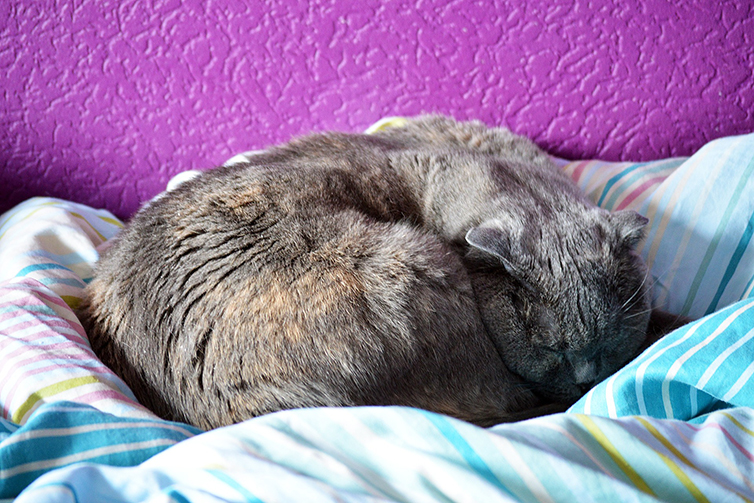
Good question. In fact, it shouldn’t involve too much time or expense to adapt your (i.e. Buster’s and yours) home to accommodate his ageing symptoms and improve his quality of life.
Arthritis and weakening joints and tendons may mean that he may have problems with climbing and jumping, which are both obviously natural for him. So, you could consider the following suggestions:
- As he ages, your cat will appreciate an especially comfortable bed. Older joints can become painful and can be eased by a soft bed. There are many available which are very well-padded.
- Ensure that his bed is placed in a warm, draught-free area, preferably safe from boisterous dogs. Place the bed on a slightly-raised platform.
- Cats, including elderly ones, love to climb and sit on high perches where they can survey the world and watch out for dogs. However, he may begin to battle with climbing as he ages, and may sometimes run the risk of falling. You can provide him with non-slip ramps and steps, which can be purchased or improvised, to ease his access to his perch.
- You may notice, as Buster ages, that he is less interested in roaming and prowling outside. In fact, there are many vets and behaviourists who advise cat servants to keep their elderly moggies indoors all the time. If that’s your cat’s choice, that’s fine. But what if it’s not? It’s very difficult to confine a cat indoors against his will. You could create some form of ‘catio’ (a large ‘cage’ made largely of wire in your garden or attached to your house.), which might be expensive but will provide your indoor cat with some access to the outdoors. (The instructions for these are available online.)
- Ageing cats still enjoy scratching, but often find it difficult to use vertical scratch posts. You could install a more horizontal one or buy one of those contraptions made for indoor cats, which include slanting scratching surfaces.
And finally…
We hope that this blog has helped those of you who have the privilege of living with an elderly feline. You can help him or her to have a good quality of life so that he/she, and you, can enjoy his Golden Years.
Sources:
icatcare.org > Elderly cats…
petmd.com > 6 tips for caring for senior cats
cat.org.uk > Caring for elderly cats and > Caring for senior cats
aspca.org > Older cats with behaviour problems
ZA-BRV-210800008
Subscribe to our Newsletter
Get to know your furry friend better! Sign up for all things dog- or cat-related.
The Hairy Facts about the dreaded hairball
12 April 2021
Help! My dog’s barking mad! Volume 2
12 April 2021
Your Itchy, Scratchy Cat – All About Cat Skin Problems
12 April 2021
The Dog’s Diet: A Bone of contention?
01 April 2021
Mango Fly Worms: How to Spot and Eliminate them
Posted on November 28,2019
Managing Mange And Mites In Your Dog
Posted on June 11,2018
Why Do Cats Purr and How? Learn What Your Cat Is Saying
Posted on October 14,2020
How to Get Rid of Ear Mites in Dogs
Posted on November 06,2019


